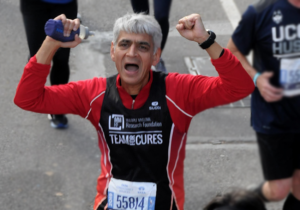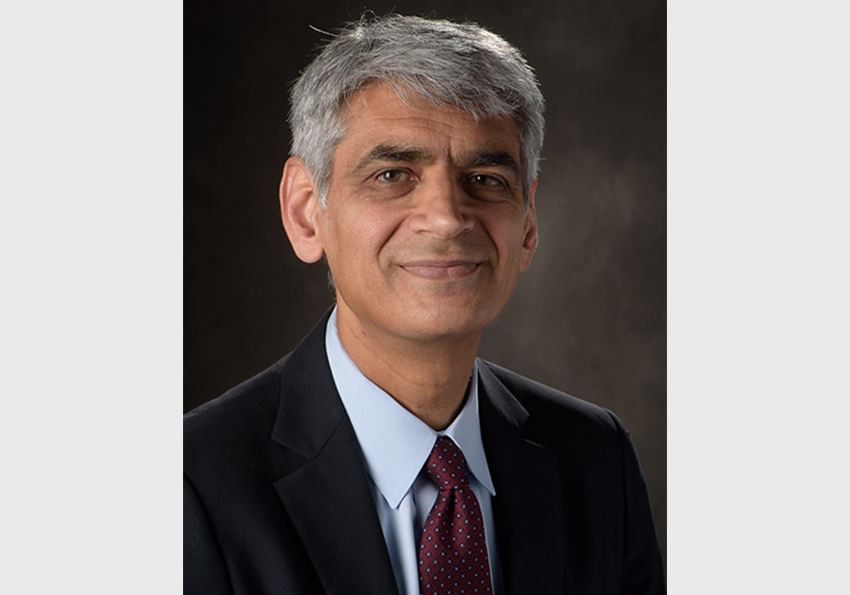Dr. Muzaffar Qazilbash, Professor, Department of Stem Cell Transplantation, Division of Cancer Medicine, The University of Texas MD Anderson Cancer Center, Houston, is also an avid marathon runner, having completed five of them. He became a Team JAF Boston Marathon runner to raise awareness and funds to highlight the issue of financial toxicity that many cancer patients face and the impact it has on their health outcome. JAF sat down to talk with Dr. Qazilbash to better understand the impact of the cost of cancer from a medical point of view.
What made you decide to pursue a career in oncology?
While in medical school, I read about cancer-promoting oncogenes and tumor suppressor genes which drove my curiosity and interest in oncology. Also, my childhood friend’s father was a medical oncologist, who was highly respected by his patients as a compassionate doctor, and he became a role model I wanted to emulate. I realized I could combine my curiosity and my desire to treat cancer patients into a career as a medical oncologist. In my field of medical oncology, and especially multiple myeloma, the disease I most frequently treat, I see patients for an extended period as the treatment regimens can be quite lengthy. Prolonged treatment with its many side effects represents a time of great vulnerability for cancer patients. However, this difficult time is also an opportunity to build trust and lasting relationships with my patients that I greatly value.
Over the course of the last 25 years, major advancements in cancer diagnostics and treatment have led to significant improvements in clinical outcomes. However, the cost of therapy, including chemotherapy, targeted agents, and more recently, immunotherapy, is substantial. What have been your observations of this intersection of life-saving treatment converging with the negative impact of financial toxicity in cancer treatment?
This question goes directly to the heart of cancer treatment today. We have made tremendous strides in understanding the biology of the disease that has helped in advancing the diagnostic tests and effective therapies. Even with sophisticated tests and state-of-the-art treatments, unfortunately, many cancer patients face serious financial adversity resulting from exorbitant treatment costs, loss of employment, and financial bankruptcy. This financial toxicity adds to the physical and emotional hardship a cancer patient is already facing. I strongly believe that we should work with patient advocacy groups, the government, and the pharmaceutical and insurance companies to make cancer treatment more affordable for our patients so their diagnosis does not mean the destruction of their health, livelihood and self-esteem.
Why do oncologists, oncology care providers (and really all physicians) need to be aware of the potential financial toxicities of treatments and how those toxicities affect the patients they treat?
Although financial hardship is not much discussed, it is increasingly recognized as a highly relevant issue in cancer care. In my own practice I have seen patients lowering the doses of their prescribed drugs or stopping them altogether because they cannot afford the prescribed doses. This can lead to suboptimal treatment, worsening of the underlying disease, and development of drug resistance due to inadequate doses. These patients often end up with more advanced and aggressive disease with horrible consequences.
With increasing awareness of financial toxicity within the medical field, especially in oncology, medical conferences have introduced special sessions on financial toxicity, and medical schools are developing curricula that address financial hardship as an important medical issue. However, we have to do a lot more to tackle the financial issues impacting on our patients’ well-being. That is why I believe in the work of JAF and support its mission to raise awareness of financial hardship in cancer patients, and its generous help so patients can focus on their medical treatment.
Are there effective tools or processes to help identify when a patient will become faced with financial toxicity?
At MD Anderson, our social workers always discuss a patient’s financial situation and provide guidance. We work as a team to identify our patients’ financial needs, the effect of cancer treatment on their employment, their family, and their ability to deal with physical and financial stress of the disease. Many patients have to leave home for extended period for their treatment, have to pay their rent, buy groceries, and meet daily expenses in the face of mounting drug costs and declining income.
This is where organizations like JAF are providing a vital service to our patients by providing financial support for their daily needs, including housing, utilities and food. The philanthropic support for cancer patients is critical, not only for developing new drugs and diagnostic tests, but also to provide financial support for their daily living and non-medical expenditure. This is what I consider treating patient as a whole, and not just the disease.”
 The Boston Marathon has become a virtual event due to the pandemic, but you are still a proud member of Team JAF, regardless of race location. Why did you choose to run on behalf of JAF?
The Boston Marathon has become a virtual event due to the pandemic, but you are still a proud member of Team JAF, regardless of race location. Why did you choose to run on behalf of JAF?
The discussion around cancer care has been moving beyond physical health to include mental and financial health as well to achieve the best long-term outcome. JAF is exactly the kind of organization I wanted to support as they are raising awareness of the cost of cancer care and provide valuable support to patients to ease their financial burden. I’m honored to raise funds for JAF to help provide financial assistance to my patients when they need it the most.
I have learned from my patients that when it comes to cancer, you take one day at a time, and rejoice every small success that comes your way. Although circumstances surrounding the Marathon have changed, I’m still proud to run in support of JAF to help cancer patients go through their treatment without having to worry about financial hardship.


